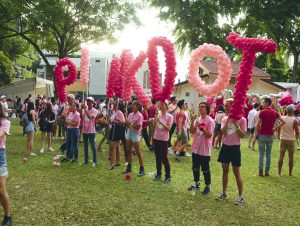Negotiating LGBTQ rights in Singapore: The margin as a place of refusal
June 24, 2022

PPink Dot, an annual LGBTQ pride event in Singapore, took place on 18 and 19 June 2022. The use of the colour pink aligns the organisers with the LGBTQ community worldwide. With Singapore known colloquially as the ‘little Red Dot’, the terms Pink and Dot represent LGBTQ communities in Singapore.
In ‘Negotiating LGBTQ rights in Singapore: The margin as a place of refusal’ (Urban Studies, 2021), Dr Kamalini Ramdas (NUS Geography) explains how Singapore’s LGBTQ communities have contested and negotiated Singapore’s dominant heteronormative narratives of family and community.
A key matter of concern for LGBTQ communities in Singapore is the existence of Section 377A of the penal code, which criminalises sex between men. The government has argued that Singapore is not ready to repeal this law, citing societal conservatism in line with ‘Asian values’, which promote the heteronormative family as the basic building block of society. For LGBTQ Singaporeans, the state’s unwillingness to repeal 377A is discriminatory and legitimises homophobia in Singapore.
Over the years, the number of people gathering at Pink Dot has increased from several hundred in the inaugural year to close to 20,000 in more recent years. Pink Dot has been successful in part because it does not present an outright proclamation of queer interests in Singapore. However, it has also been criticised for taking a ‘soft approach’, silencing the more insidious forms of violence and discrimination experienced by LGBTQ Singaporeans in the domestic sphere.
Pink Dot symbolises resistance to the state’s constructions of family and what constitutes legitimate love by introducing the possibility for love and family to take alternative forms, and the right for anyone to experience love regardless of their sexuality. There have also been satellite Pink Dots which have taken root elsewhere, from London to New York and Hong Kong. The global reach of Pink Dot shows how LGBTQ is not just a ‘Western’ issue as it is commonly claimed to be, and demonstrates Singapore’s influence on LGBTQ rights.
Sayoni is a women’s group in Singapore that advocates for lesbian, bisexual, transgender and queer (LBTQ) women. In 2017, it submitted a Human Rights Documentation Report at the United Nations Convention on the Elimination of Discrimination Against Women at Geneva. By doing so, Sayoni advocates for LBTQ women while providing feedback to the international community on the ways the Singapore government has or has not complied with the terms of the convention with regard to LBTQ women. Through its advocacy work, Sayoni has demonstrated how 377A is more than a ‘gay male problem’, as well as the importance of taking the rights debates beyond the single issue of repeal and sexuality alone.
Lastly, Dr Ramdas explains that education in Singapore must provide more opportunities for students to learn how to speak a language of rights based on principles of justice, rather than silencing themselves in the name of peace-keeping. Only then will students be better able to advocate for themselves or on behalf of those who are less privileged.
Read the article here.
